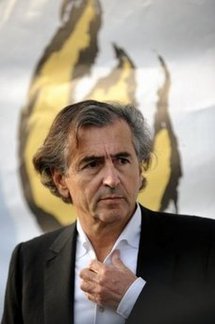
Bernard-Henri Levy (AFP/File/Fabrice Coffrini)
He has since discovered, however, that Botul is a fictional character, created as a literary satire by journalist Frederic Pages, who writes for the tongue in cheek Le Canard Enchaine.
Levy admitted he had often quoted Botul's work "The sex life of Immanuel Kant" during public appearances and now in the pages of his latest book.
"As it turns out, it was a hoax," admitted the author in a statement posted late Monday on the website of his magazine, La Regle du Jeu.
"It was a truly brillant and very believable hoax from the mind of a Le Canard Enchaine journalist, who remains a good philosopher all the same," said Levy, known by his initials BHL.
"So I was caught, as were the critics who reviewed the book when it came out," he wrote. "The only thing left to say, with no hard feelings, is kudos to the artist!"
As the revelation created a buzz on the Internet, Pages issued a tongue-and-cheek statement insisting that Botul "does exist". The man was born in southern France and lived from 1896 to 1947, he said.
He described him as the father of a school of thought called "Botulism" and stressed that he had left a rich "oral tradition" in philosophy.
"The 'Sex life of Immanuel Kant' is his most famous conference, delivered in Paraguay in 1946 and translated into nine languages," said editor Sandrine Palussiere.
BHL's embarrassing mistake was discovered by journalist Aude Lancelin of the left-leaning weekly Nouvel Obs.
"A simple Google search would have alerted sad old BHL," wrote Lancelin.
Levy's gaffe made the rounds of Internet websites with many commentators saying that France's leading expert on modern thought -- and a regular on TV chat shows and celebrity magazines -- had thoroughly embarrassed himself.
Levy last stirred controversy when he published an account in 2008 of his visit to Georgia during the war with Russia that French newspapers said contained excerpts that were made up.
Pages also pens the popular "Carla B.'s diary" in Le Canard Enchaine in which a fictional first lady moans about life at the Elysee with President Nicolas Sarkozy, whom she refers to as "chouchou" (honey dearest).
-------------------------------------------------------------------
Levy admitted he had often quoted Botul's work "The sex life of Immanuel Kant" during public appearances and now in the pages of his latest book.
"As it turns out, it was a hoax," admitted the author in a statement posted late Monday on the website of his magazine, La Regle du Jeu.
"It was a truly brillant and very believable hoax from the mind of a Le Canard Enchaine journalist, who remains a good philosopher all the same," said Levy, known by his initials BHL.
"So I was caught, as were the critics who reviewed the book when it came out," he wrote. "The only thing left to say, with no hard feelings, is kudos to the artist!"
As the revelation created a buzz on the Internet, Pages issued a tongue-and-cheek statement insisting that Botul "does exist". The man was born in southern France and lived from 1896 to 1947, he said.
He described him as the father of a school of thought called "Botulism" and stressed that he had left a rich "oral tradition" in philosophy.
"The 'Sex life of Immanuel Kant' is his most famous conference, delivered in Paraguay in 1946 and translated into nine languages," said editor Sandrine Palussiere.
BHL's embarrassing mistake was discovered by journalist Aude Lancelin of the left-leaning weekly Nouvel Obs.
"A simple Google search would have alerted sad old BHL," wrote Lancelin.
Levy's gaffe made the rounds of Internet websites with many commentators saying that France's leading expert on modern thought -- and a regular on TV chat shows and celebrity magazines -- had thoroughly embarrassed himself.
Levy last stirred controversy when he published an account in 2008 of his visit to Georgia during the war with Russia that French newspapers said contained excerpts that were made up.
Pages also pens the popular "Carla B.'s diary" in Le Canard Enchaine in which a fictional first lady moans about life at the Elysee with President Nicolas Sarkozy, whom she refers to as "chouchou" (honey dearest).
-------------------------------------------------------------------









 Home
Home Politics
Politics









